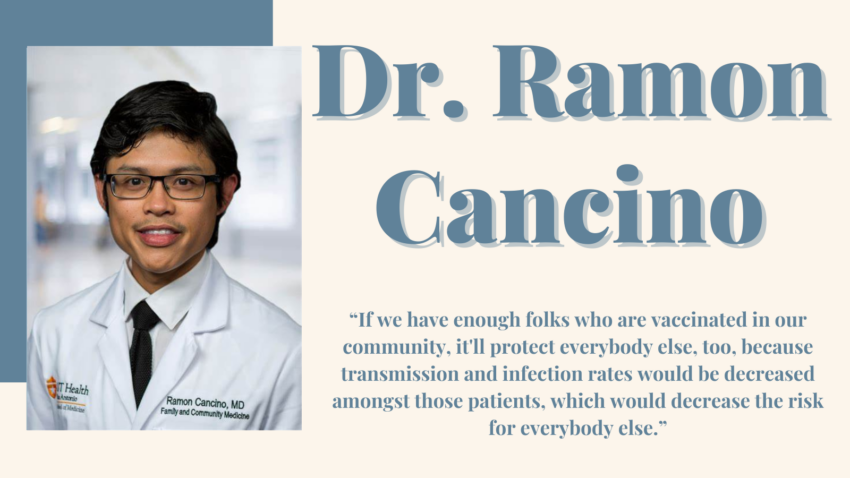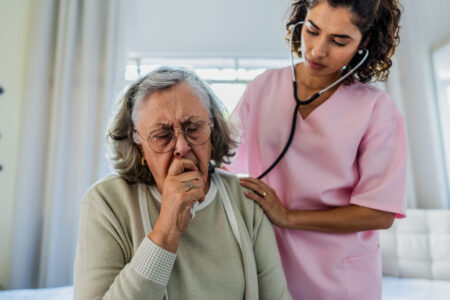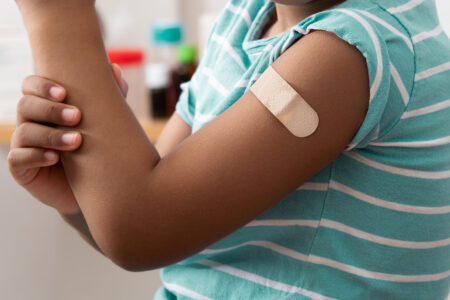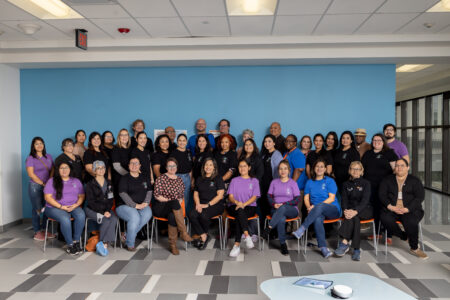
Share On Social!
The COVID-19 virus is still a threat for many.
U.S. Latinos continue to suffer a from a high number of COVID-19 cases.
Fortunately, vaccines are available and free for children and adults, and they’re the best way to protect yourself and your family against the worst outcomes of the virus!
Dr. Ramon Cancino, a family medicine physician at UT Health San Antonio and leader of the UT Health Physicians Primary Care Center, stressed the importance of getting vaccinated.
“If we have enough folks who are vaccinated in our community, it’ll protect everybody else, too, because transmission and infection rates would be decreased amongst those patients, which would decrease the risk for everybody else,” Cancino said.
Difficulties During the COVID-19 Pandemic
During the height of the COVID-19 pandemic, Cancino helped make sure all the primary care locations that he oversees had the necessary resources to help patients.
“I was involved with really trying to help allocate limited vaccine resources to a large, high-need patient population, and working with senior leadership and school leadership here to think through how we do this well, knowing that we have a lot of need and limited resources,” Cancino said.
Navigating telehealth options for patients was crucial for Cancino and his staff.
“We saw ourselves as sort of that first line of health care for many of our patients. We needed to adjust so that we can get our patients the care they needed, even if they were not able to leave home because of the pandemic,” Cancino said.
When the vaccine became available, not everyone could get it right away.
“We really saw how easy it was for someone who really needed a vaccine to not get a vaccine, or who really needed a vaccine to not understand why the vaccination was going to be important for them, or their close family members,” Cancino said.
Education and sharing evidence-based information became key for providers and patients, Cancino said.
“We did a lot of education, not only of our patient, but also honestly our staff, too, because we had to recognize the significance of vaccines broadly, as well as the access challenges a lot of patients had in general, for health care,” Cancino said. “We needed to learn how to communicate to patients about these things in the middle of a pandemic.”
Meeting the Needs of the Patient Population
In San Antonio, where 65.8% of people are Latino, people have unique healthcare needs.
Cancino and his staff recognize how culture and language can build trust and a foundational understanding of someone’s experience with health care.
“I think the impact of someone who’s been brought up in the Hispanic, Latino culture certainly does reflect in their dietary habits, their understanding of health care, as well as all of those important trigger points in terms of what is important in one’s health,” Cancino said.
 Latinos have a high risk for preexisting conditions like diabetes or obesity.
Latinos have a high risk for preexisting conditions like diabetes or obesity.
This could ultimately contribute to complications with COVID-19, from severe symptoms to hospitalization.
“We do a lot of education around the importance of a healthy lifestyle. But then also do a lot of management of blood pressure control, cholesterol control using medications, in addition to lifestyle,” Cancino said.
“It all kind of boils down to sort of behavior and lifestyle and how can we – knowing the background of our patient population and understanding the frame of reference that our patients have – help support these changes so that our patients live longer, healthier, much more fulfilling lives.”
Staying Informed and Vaccinated
COVID-19 vaccines continue to be available to everyone in the United States free of cost, according to CVEEP.
Still, incorrect information and stigma hinder some people from getting vaccinated.
“We look to the evidence. We have the scientific evidence. That’s sort of what we educate our patients around. We are very mindful of some of the myths that are sort of out there in space right now,” Cancino said. “But at the same time, we have to recognize that we need to meet our patients where they are and have that conversation.”
For those that may still be hesitant to receive a COVID-19 vaccination, Cancino suggests talking to your physician for advice.
“While the internet has a lot of information, I think that meeting with a primary care physician who’s received specialized training, to be able to have a conversation about vaccinations is probably worthwhile use of your time,” he said.
Ultimately, the COVID-19 vaccine can protect both you and your loved ones, along with preventing harsher outcomes, Cancino said.
“If we avoid getting COVID-19, we also avoid the potential concern for long, maybe even irreversible, Long COVID symptoms,” he said.
How You’re Covered Against COVID-19
The COVID-19 vaccine is available for free for adults and children, according to the You’re Covered website.
Use Vaccines.gov to find a location near you.
Then call or visit their website to make an appointment.
Find additional vaccine information on the You’re Covered website in English and Spanish.
Still Undecided on COVID-19 Vaccination?
To encourage Latinos to get vaccinated, Salud America! is sharing stories of real Latinos who are squashing incorrect information and getting vaccinated.
Take, for example, Maria Maldonado!
When the vaccine became available for adults, Maldonado couldn’t wait to get one.

“Because I trust science. They developed it fast, but they still took the protocols and the safety measures that they had to take,” Maldonado said.
Once the vaccine was available for children, Maldonado got her 9-year-old son Jacob vaccinated. She hopes that other Latino parents will vaccinate their children and help protect the Latino community!
“I feel a sense of relief. And I feel like it’s a little bit of a step forward in trying to help one another, and being a good citizen,” Maldonado said.
Find COVID-19 vaccination locations near you in English and Spanish.
Editor’s Note: Salud America! at UT Health San Antonio is a partner in the “You’re Covered” campaign of CVEEP, led by the Alliance for Aging Research, Healthy Women, and the National Caucus and Center on Black Aging.
By The Numbers
142
Percent
Expected rise in Latino cancer cases in coming years



